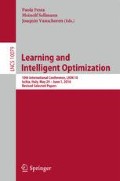Abstract
Algorithm selection is a prominent approach to improve a system’s performance by selecting a well-performing algorithm from a portfolio for an instance at hand. One extension of the traditional algorithm selection problem is to not only select one single algorithm but a schedule of algorithms to increase robustness. Some approaches exist for solving this problem of selecting schedules on a per-instance basis (e.g., the Sunny and 3S systems), but to date, a fair and thorough comparison of these is missing. In this work, we implement Sunny’s approach and dynamic schedules inspired by 3S in the flexible algorithm selection framework flexfolio to use the same code base for a fair comparison. Based on the algorithm selection library (ASlib), we perform the first thorough empirical study on the strengths and weaknesses of per-instance algorithm schedules. We observe that on some domains it is crucial to use a training phase to limit the maximal size of schedules and to select the optimal neighborhood size of k-nearest-neighbor. By modifying our implemented variants of the Sunny and 3S approaches in this way, we achieve strong performance on many ASlib benchmarks and establish new state-of-the-art performance on 3 scenarios.
Access this chapter
Tax calculation will be finalised at checkout
Purchases are for personal use only
Notes
- 1.
- 2.
Optimizing a schedule is NP-hard; thus the size of the input set, defined by k, must be kept small to make the process applicable during runtime.
- 3.
The source code and all benchmark data are available at http://www.ml4aad.org/algorithm-selection/flexfolio/.
- 4.
PAR10 is the penalized average running time where timeouts are counted as 10 times the running time cutoff.
- 5.
References
Amadini, R., Gabbrielli, M., Mauro, J.: SUNNY: a lazy portfolio approach for constraint solving. TPLP 14(4–5), 509–524 (2014)
Baral, C.: Knowledge Representation, Reasoning and Declarative Problem Solving. Cambridge University Press, Cambridge (2003)
Bischl, B., Kerschke, P., Kotthoff, L., Lindauer, M., Malitsky, Y., Frechétte, A., Hoos, H., Hutter, F., Leyton-Brown, K., Tierney, K., Vanschoren, J.: ASlib: a benchmark library for algorithm selection. AIJ 237, 41–58 (2016)
Hoos, H., Kaminski, R., Lindauer, M., Schaub, T.: aspeed: Solver scheduling via answer set programming. TPLP 15, 117–142 (2015)
Hoos, H., Lindauer, M., Schaub, T.: claspfolio 2: Advances in algorithm selection for answer set programming. TPLP 14, 569–585 (2014)
Huberman, B., Lukose, R., Hogg, T.: An economic approach to hard computational problems. Science 275, 51–54 (1997)
Kadioglu, S., Malitsky, Y., Sabharwal, A., Samulowitz, H., Sellmann, M.: Algorithm selection and scheduling. In: Lee, J. (ed.) CP 2011. LNCS, vol. 6876, pp. 454–469. Springer, Heidelberg (2011). doi:10.1007/978-3-642-23786-7_35
Kotthoff, L.: Algorithm selection for combinatorial search problems: a survey. AI Mag. 35, 48–60 (2014)
Lindauer, M., Hoos, H., Hutter, F., Schaub, T.: Autofolio: an automatically configured algorithm selector. JAIR 53, 745–778 (2015)
Malitsky, Y., Sabharwal, A., Samulowitz, H., Sellmann, M.: Boosting sequential solver portfolios: knowledge sharing and accuracy prediction. In: Nicosia, G., Pardalos, P. (eds.) LION 2013. LNCS, vol. 7997, pp. 153–167. Springer, Heidelberg (2013). doi:10.1007/978-3-642-44973-4_17
Rice, J.: The algorithm selection problem. Adv. Comput. 15, 65–118 (1976)
Xu, L., Hutter, F., Hoos, H., Leyton-Brown, K.: SATzilla: portfolio-based algorithm selection for SAT. JAIR 32, 565–606 (2008)
Author information
Authors and Affiliations
Corresponding author
Editor information
Editors and Affiliations
Rights and permissions
Copyright information
© 2016 Springer International Publishing AG
About this paper
Cite this paper
Lindauer, M., Bergdoll, RD., Hutter, F. (2016). An Empirical Study of Per-instance Algorithm Scheduling. In: Festa, P., Sellmann, M., Vanschoren, J. (eds) Learning and Intelligent Optimization. LION 2016. Lecture Notes in Computer Science(), vol 10079. Springer, Cham. https://doi.org/10.1007/978-3-319-50349-3_20
Download citation
DOI: https://doi.org/10.1007/978-3-319-50349-3_20
Published:
Publisher Name: Springer, Cham
Print ISBN: 978-3-319-50348-6
Online ISBN: 978-3-319-50349-3
eBook Packages: Computer ScienceComputer Science (R0)

